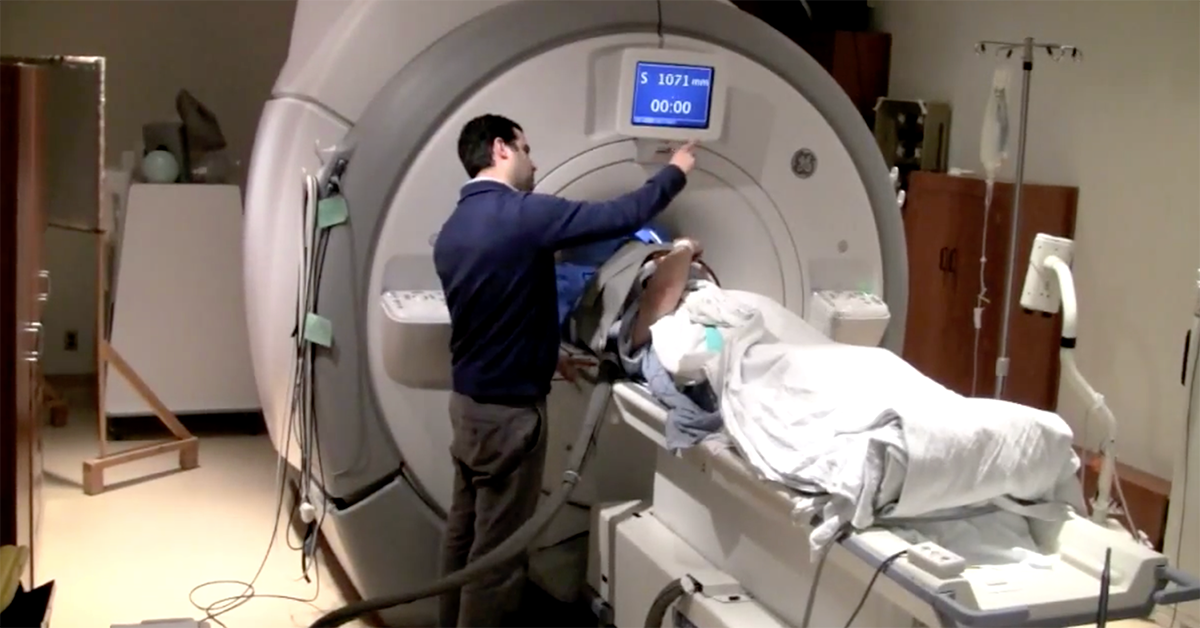Full media release
Revolutionary scalpel-free surgery proving successful
Toronto, ON (December 19, 2012) - A Canadian first, Sunnybrook brain scientists have pioneered the use of MRI-guided focused ultrasound to successfully treat a handful of patients who suffer from debilitating tremors in their arms and hands.
"This new non-invasive procedure is revolutionizing medicine," says Dr. Michael Schwartz, principal investigator of an early-stage clinical trial of the therapy and head of the Division of Neurosurgery at Sunnybrook Health Sciences Centre. "Our goal was to evaluate the safety and initial effectiveness of MRI-guided focused ultrasound in treating patients with disabling tremor, and we are optimistic about the results we are seeing thus far. This technology could have far-reaching implications for many brain conditions including brain tumours and other movement disorders."
This outpatient procedure is described as "scalpel-free surgery" due to the lack of an incision. There is no general anesthetic required and the patient remains awake and alert during treatment and can go home the next day. Although only five patients have been treated so far in Canada, the procedure appears to be safe, and associated with limited side-effects.
In this trial, the technology allows investigators to focus ultrasound waves under MRI guidance through a patient's skull to reach an area located deep in the brain. Focused ultrasound is then used to lesion the cells that are responsible for the tremor.
During the treatment, real-time feedback from the MRI functions as a thermal "map" for the surgeon. It is used first to identify the target, for treatment planning, and is then used to guide the ultrasound as it is applied. Finally, it is used to immediately determine if the treatment worked.
The study enrolled patients between the ages of 18 and 80 years old, with a condition known as chronic 'essential tremor'. In these cases, medication had failed to control the condition. Participants had only one side of the body treated.
"There was a clearly visible and dramatic improvement in tremor in the patient cases seen so far," says Dr. Andres Lozano, a neurosurgeon at the Krembil Neuroscience Centre at Toronto Western Hospital, and co-investigator of the study. "Improvement in the dominant hand is seen while the patient is still in the MRI scanner. Three months post-procedure there were significant improvements in activities such as writing and drinking from a cup, which were not possible prior to surgery."
The study is the result of collaboration between world leading experts in ultrasound physics and radiosurgery at Sunnybrook as well as movement disorder surgery at the Krembil Neuroscience Centre at Toronto Western Hospital. ExAblate Neuro has a specialized helmet-like device, manufactured by InSightec Ltd. of Israel, which transmits the ultrasound waves and is the only focused ultrasound system on the market with the capability to perform brain procedures.
"Because the brain is the most difficult organ to treat, we believe that one of the best ways to validate and advance the entire field of MRI-guided focused ultrasound is to support the rapid development of promising brain applications," said Dr. Neal Kassell, chairman of the Focused Ultrasound Foundation. "We are delighted to be collaborating with the team at Sunnybrook, which is one of the world's pre-eminent focused ultrasound sites."
"Our clinical experience with focused ultrasound is quite early and the results preliminary, so while we are optimistic that this trial will lead to safe and effective treatment options for patients with essential tremor in the future, more research is needed for both longer-term effects and clinical efficacy," adds Dr. Schwartz, also a professor in the Department of Surgery at University of Toronto.
Essential tremor is the most common movement disorder and is often resistant to medical treatment. A significant portion of patients with the condition have reduced quality of life related to impairment in the use of their dominant hand for eating, drinking, writing and other activities requiring fine movements.
Recently presented at the annual meeting of the Société de Neurochirurgie de Langue Française in Paris France, this prospective, non-randomized, single-arm study is being conducted under a protocol approved by Health Canada. It has been made possible by a public/private partnership involving Sunnybrook, InSightec and the Focused Ultrasound Foundation, which is funding the study. To date, five participants have undergone the treatment as part of the trial, and one more is required for the study completion.
In addition to the Departments of Neurosurgery at Sunnybrook and Toronto Western Hospital, other collaborators on this study come from the Platform of Physical Sciences and Departments of Medical Imaging, Neurology, and Anaesthesia at Sunnybrook, and the Division of Neurosurgery at University of Alberta.
Trials are currently planned or underway at Sunnybrook to apply MR-guided focused ultrasound to treat cancers and tumours of the brain, breast, bone, neck, and rectum, as well as benign uterine fibroids.
-30-
Media Contact:
Nadia Norcia Radovini
Communications & Stakeholder Relations
Sunnybrook Health Sciences Centre
416.480.4040
nadia.radovini@sunnybrook.ca







